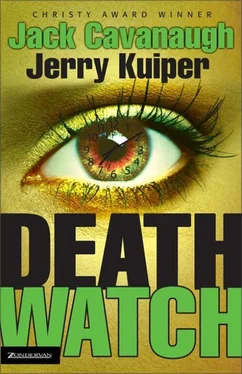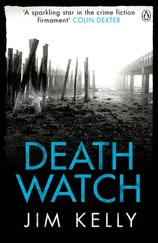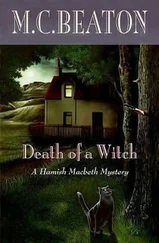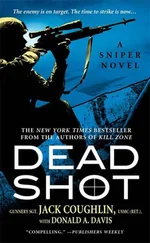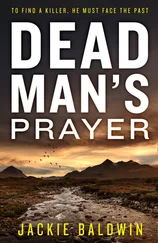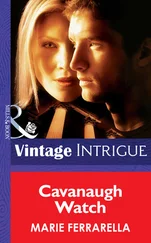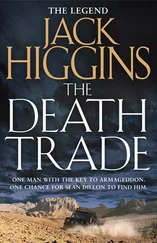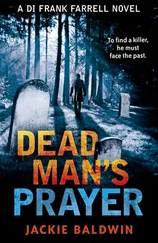“Anyway, Cindy had some business down there. Something about scheduling an artist for a show. Not usually her job. She was doing it as a favor to the museum. Bea and me, we’d always talked about going. We’d get the brochures from travel agents and sit at the kitchen table and plan it all out, but then we’d start to worry about who was going to water the yard, and we’d have to stop the mail.“ His mouth clamped shut; his lower lip trembled.
Sydney reached over and covered Vandeveer’s hand with hers.
“Got the call that morning,” he said. “The news said the plane went straight down. Almost vertical.”
Neither spoke for a time.
The clock on the wall ticked off a minute.
Vandeveer lay back in his chair and stared into space, his shirt open. Wires stretched from a machine to the white circle patches on his chest.
“Do you have any other family?”
“A brother. Both parents are dead. Never knew my dad. I was the product of one last good-bye before he shipped out. He was killed at Guadalcanal. My mother raised us. She died of lung cancer a few years back. Everybody smoked in those days.”
Sydney was almost afraid to ask, “And your brother?”
“Canada,” Vandeveer said. “He’s a minister of a church up there. He was always the good one. Ever since he was little he had a religious streak in him. You know how kids pretend they’re a cowboy or Superman? Lawrence would line up chairs, use a table for a pulpit, and pretend he was Billy Graham.”
He shook his head. “I never bought into it, myself. Especially after Mildred died. She was a strong Christian woman. Look how much good it did her.”
Sydney wanted to disagree with him, but now didn’t seem the time. “Have you talked with your brother recently?”
“Ah!” Vandeveer straightened himself up in the chair. “Glad you mentioned that. I’ve been meaning to tell you something. Lawrence called yesterday. Strange, really. Said he’d received a phone call about me. The caller didn’t identify himself. The caller told Lawrence I was marked for death or something like that. He called to see if I was all right.”
Sydney leaned forward. “Was it someone who knew about your Death Watch?”
“That’s the funny thing. I hadn’t told anyone yet. I was about to call Howard Kressler—a guy I know, another model train hobbyist—when the phone rang and it was Lawrence. Why? Is that important?”
Sydney was writing on her notepad. “It’s the first time we’ve heard of someone other than the vict other than the person to whom the death watch notice is addressed, being notified. You’re certain he received a notice about you and not him?”
“Who would want to kill Lawrence? He’s perfect.”
Sydney wrote down Lawrence’s phone number.
The sound of hurried footsteps came from the kitchen. Hunz Vonner could be heard saying, “Hold on, I’ll ask him.” As he stepped through the doorway, he covered the mouthpiece of his cell phone. He didn’t ask if he was interrupting. “Vandeveer, have you had any injections recently? Say, within the last four or five months?”
Lyle Vandeveer looked up, searching his memory. “No…not that I can recall…I’ve been pretty healthy, haven’t seen the doc… wait, injection? I had a flu shot last Christmas. Is that what you’re looking for?”
Hunz Vonner’s eyes widened. He spoke into the cell phone. “That’s affirmative. A flu shot. Yeah. It does, doesn’t it?” He turned and left the same way he came. Heels clicking, his voice grew softer, then dissipated completely with the closing of the front door.
“What was that all about?” Vandeveer asked Sydney.
“I have no idea.”
“Can I ask you a question?” Vandeveer said. “What on God’s green earth is going on with these notices? I mean, it’s sick, isn’t it? Who’s behind it?
Sydney was amazed Vandeveer hadn’t already asked this question. She attributed it to the invasion of cameras, equipment, and personnel. All of it at once could be intimidating. Under similar circumstances Sydney had once interviewed a man who couldn’t remember his wife’s name on camera.
“Mr. Vandeveer, we’re as perplexed as you are.”
Vandeveer thought about this a moment. “Do you really think you can save me?”
“We have security, medical personnel, and equipment. You’re going to beat this thing, Mr. Vandeveer.”
“Did I tell you when my wife died, the plane fell vertically?”
“Yeah.”
“It landed on some houses. Killed the people inside. Security and medics couldn’t have done anything to save those people.”
“I don’t think a plane’s going to fall on your house, Mr. Vandeveer.”
“Yeah, you’re probably right. Still… ”
It was 9:41 p.m.
Twenty-four minutes remained.
Sydney learned that the US Post Office delivered Lyle Vandeveer’s death watch notice together with a MasterCard bill, an offer to join the History Book of the Month club, a fund-raising letter from Azusa Pacific University—Cindy had attended there for two years before transferring to USC—and a page of pizza coupons.
The envelope and letterhead matched: cream-colored linen paper. A simple DW appeared at the top of the page, centered, TrueType Castellar font, thirty-six point. There was no address, nor was there any return address on the envelope. The message was identical to the one Jeffrey Conley received in telegram form, only the time stamp was different. No fingerprints other than Lyle’s and the postman’s were on the envelope. It had a Pasadena postmark.
Lyle reported receiving a confirmation phone call, only he wasn’t home to take it. It was on his answering machine. The police had both the letter and the answering machine tape.
A broadcast van technician poked his head in the room. “Mr. Vandeveer? There’s a crazy broad out here and she says she won’t go away until she talks to you. Says she’s your neighbor. Opal Whitcomb?”
Vandeveer nodded at Sydney. “He’s right, she is a crazy broad. Lives next door. She wanders the neighborhood with a coffee cup, on the prowl for java handouts and gossip. But she’s a good neighbor and good company when she wants to be.” He looked back to the technician. “Tell her I said I’ll call her in the morning and fill her in. Oh, and tell her I bought some of that hazelnut cream blend she likes.”
It was 9:55 p.m.
Ten minutes left.
Hunz Vonner strode into the room. There was no sign of a cell phone.
“Has your German station developed any leads?” Sydney asked.
“I’ll fill you in later. Mr. Vandeveer, how are you feeling?”
“Like a movie star,” he said. “I haven’t had this much attention since. . come to think of it, I’ve never had this much attention. Can I put my shirt on when the cameras start rolling?”
“Certainly,” Sydney said. “We’ll be live on the eleven o’clock news.”
“Can you show my train layout? Like I said, it’s nothing special, but it’ll drive Howard Kressler up the wall to see it on TV. He thinks he has the best layout on the West Coast.”
9:59 p.m.
The paramedics checked Lyle Vandeveer’s heart pressure. They ran another EKG and gave a thumbs-up sign.
“I feel great,” Vandeveer said.
His voice was shaky.
10:00 p.m.
Billy Peppers leaned against a palm tree on the other side of Fair Oaks Avenue opposite Lyle Vandeveer’s house. He held a Nike shoe box under his arm. With his free hand he scratched his bearded cheek.
He hadn’t had a good bath in nearly a month, just a little splashy-splash washup in a fountain now and then. Whenever he went that long without a bath his head and beard got itchy to the point of distraction.
Читать дальше
